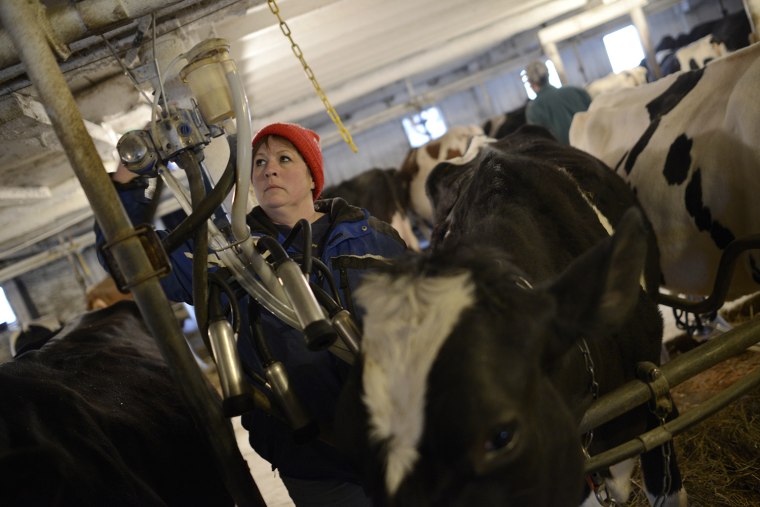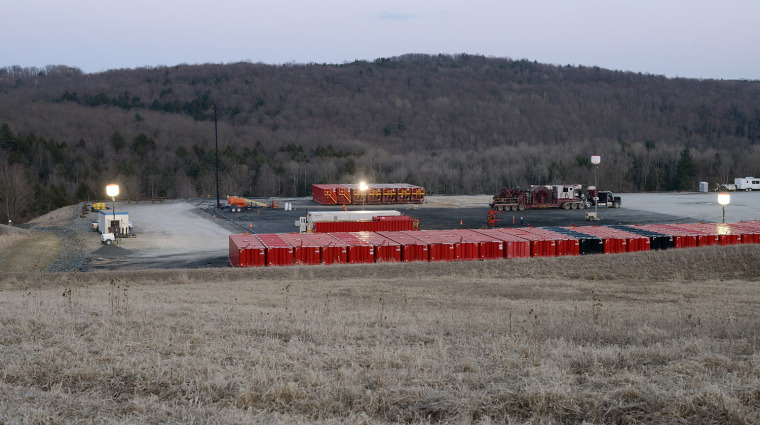By Bill Dedman, NBC News, and Karen Weintraub
It's difficult to find scientists who have not lined up on one side or another on hydraulic fracking for oil and natural gas. The anti-fracking groups have their scientific talking points, and the pro-fracking groups have their counterclaims. Some of the scientists who have put out pro-fracking reports have turned out to be tied to the industry. When even the federal panel formed to study the issue is stacked with industry supporters, it’s hard for environmentalists and health advocates to believe its conclusions.
"Cutting through the 'noise' for the average citizen in indeed extremely difficult," said Peter Collings, a physics professor at Swarthmore College in Pennsylvania, who has lectured about fracking. The truth about fracking, he said in an e-mail interview, lies "somewhere in between" what the regulation-hating gas industry tells the public and what the environmentalists claim.
"Fracking can be done in a way that safeguards subsurface water and surface lands and wildlife, prevents a good deal of the release of methane to the atmosphere, etc., but it is expensive and lessens profits," Collings said. "I think it is safe to say that industry has not chosen to go this route, so the anti-fracking movement has a legitimate cause, because the environmental impact of fracking is real and preventable."
Related story
Disputes over environmental impacts of 'fracking' obscure its future
To help cut through the claims and counterclaims, here are a few of the issues debated in the scientific discussion about fracking.
Better than coalNatural gas obtained through fracking is thought to have an important advantage over coal.
Coal has been a scourge on the environment and public health for decades. It is a major contributor of mercury, nitrous oxide, sulfur dioxide, and other air pollutants, and contributes to diseases including asthma, lung cancer, heart disease, and stroke. In one Harvard analysis, researchers found that nearly 11,000 people died in Appalachia every year between 1997 and 2005 from coal-related injuries, mostly related to mining, or health problems, at a cost of $74.6 billion. By contrast, the coal industry generated just $8 billion in economic activity for the region over that period, they said. Overall, the researchers concluded that the true cost of coal-generated electricity is two-to-three times higher than what we pay for it.
And that toll doesn’t count most damage caused by global warming. In 2005, coal was used to generate 50 percent of the electricity in the United States, but was responsible for more than 80 percent of its emissions of carbon dioxide, a greenhouse gas.
The increase in fracking reduced America’s dependence on coal by 10 percent as natural gas production climbed 15 percent between 2007 and 2011.
Then, in 2011, Cornell University researchers found that methane leaking from fracking wells during extraction could cause more damage to the environment than coal production – a conclusion that remains debated.
Daniel P. Schrag, a professor of geology and director of Harvard’s Center for the Environment, argued in a 2012 paper that the Cornell researchers failed to take the time horizon into account. Looking at the next few decades, the leaked methane might be worse than carbon dioxide produced from coal generation, he wrote, but CO2 is far more damaging to the environment over more than a century. Using a different method of counting damage from methane, Schrag came up with a much lower figure for the environmental damage of burning natural gas, and upheld gas’ image as a much cleaner fuel than coal.
Another advantage to fracked gas, also called shale gas: Swapping it for coal in energy production will be relatively easy, Schrag said in an interview. Unlike nuclear power plants, which cost billions of dollars and take a decade or more to permit and build, power plants capable of burning natural gas already exist and are working at just 30 percent of capacity. This makes shale gas a logical "bridge" fuel between coal and indisputably cleaner forms of fuel, such as wind and solar, which cannot yet deliver cost-effective power, Schrag said.
Earthquake riskEnvironmentalists have also raised the specter that fracking can cause earthquakes. Several studies have linked drilling with seismic activity, though virtually all have been small tremors that could be felt only with seismic instruments – not at ground level. In August 2012, the Oil and Gas Commission of British Columbia issued a report linking tremors between April 2009 and December 2011 with increased fracking activity in the region.
Demand for waterFracking requires a tremendous amount of water. Every well requires 1 million to 3 million gallons of water each time it is fracked, former EPA administrator Lisa Jackson said in 2011. This demand for water is already causing problems, particularly in the water-starved West. Last year in Colorado, for example, farmers lost out in water auctions to suppliers for fracking operations.
Harm to alternative energy research?A harder-to-see drawback of cheap, plentiful natural gas, Schrag wrote in his 2012 article, is that it deters the development of even cleaner forms of energy, such as wind and solar. As long as fossil fuels are cheap and relatively easy to obtain, demand for them will continue to increase.
The Obama administration, including the Department of Energy subcommittee appointed to study fracking, sees a middle ground, allowing oil and gas companies to continue fracking without posing too much of a risk to residents and communities near the wells. Jackson, the EPA administrator, told her 2011 audience that the industry needs to self-police and embrace sensible government regulations. Toward that end, energy companies and environmental groups recently announced a plan for standards that they said would lead to safer fracking.

Threat to food chain?
No evidence exists that fracking chemicals have made their way into the food chain, though Cornell University researchers reported last year in a peer-reviewed study that cattle grazing near fracking operations appeared to suffer health impacts. Pro-industry groups call the study "fatally flawed."
Bill Dedman is an investigative reporter with NBC News; Karen Weintraub is a freelance health and science reporter in Boston.
More from Power Shift, an NBC News/CNBC special report:
Part 1: Energy boom dawning in America
Part 2: Oil, gas sector fuels US economy
Part 3: How the energy boom could shake up the global order
Part 4: Disputes over environmental impact obscure fracking's future
